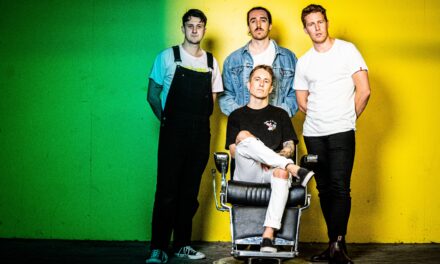You can make the argument that there hasn’t been a more polarizing band in the past 25 years than Weezer. They released their debut album, The Blue Album, in 1994 and thanks to singles “Say It Ain’t So,” “Buddy Holly,” and “Undone — The Sweater Song” immediately made an impact on music. Right in the middle of grunge and punk-rock taking its place in the mainstream, Weezer made an album that didn’t have a place in either of those genres, but was adored all the same.
Perhaps it was the geeky side of their music that stood out, or maybe the self-deprecating side, or maybe it was even that — in the gloomy days of 90’s music — Weezer could make such a successful album that didn’t sound remotely gloomy. It’s no secret that Weezer took a stylistic turn with their follow-up, 1996’s Pinkerton, and things changed for the band.
There’s no need to go through and re-discuss the history of Weezer and what followed after Pinkerton, but that album — perhaps more than any other — summarizes perfectly what Weezer is and isn’t. That’s not because of the sound that it contains, but it’s more about the attitude that Weezer had at that time, and how it set the tone for their future. At a time when everyone expected them to write another “My Name Is Jonas” or “Buddy Holly,” the band gave us “Tired of Sex” and “El Scorcho.”
Weezer would do this time and time again throughout their illustrious career, see: “Beverly Hills,” “(If You’re Wondering If I Want You To) I Want You To,” and “Feels Like Summer.” More recently, they released a cover of Toto’s “Africa” after a dedicated fan on Twitter pushed for it admirably. While they took this and ran with it, they weren’t simply content with this new-age success. Not long after, the band announced their new album, The Black Album, and began the promotional cycle for this release. However, Weezer never simply does things by the book, and thus they surprise-dropped an all covers album, The Teal Album — featuring their cover of “Africa,” A-ha’s “Take on Me,” TLC’s “No Scrubs” and more.
So when the opportunity arose to speak to founding member/drummer Patrick Wilson about the band’s legacy, future, and more, there was no way to say no.
Substream: We’ll start with your new album, The Black Album, which of course is not your first self titled/color coded album. What made it to where this album was going to be the next installment, specifically the color “black”?
Wilson: I think somehow maybe 2-3 years ago, Rivers might have mentioned something. It sort of became this, I don’t wanna say meme, but idea that people ran with. At some point we were like, “Why don’t we make the Black Album? People are already talking about it, so lets just do it.”
One of my friends sent me a portion of an interview Rivers did recently where he was discussing his entire catalog of demos that he still has and uses; even for material on this album. So when he comes to you and says “I have this demo from the 90’s” what do you say?
Wilson: I love it. I think just the fact that we’re still excited for music after all this time and the way he approaches crafting a song has changed over the years and will probably change again. He’s so prolific, and a lot of times there’s already modules waiting to go in. It’s very crafty.
Can you walk me through the normal process of how a Weezer songs come together? Is there even a process?
Wilson: I personally struggle. I came up with bands like Pink Floyd and Led Zeppelin. Those bands — I’m not sure Led Zeppelin has great songs, but they have great records. My blind spot is, “what is a good song?” As far as The Black Album, it was a very different approach to making the tracks. We would just go over to Dave’s house (Dave Sitek, producer and member of TV on the Radio), and he and I would just talk for an hour a half, go in the studio and play for 45 minutes. We were just hanging out. His approach is very NPC style, like a lot of hip hop people, it’s a different way to assemble stuff. You still have to have fun ideas to put them all together. I felt like my job was to go in there and play something that’s fun.
So before The Black Album came The Teal Album. We all know, or most do, how the cover of “Africa” came to be. But what did you expect then you released it? Did you ever think it would be something big, or that it wild just be a small thing for a nice market of your fans?
Wilson: “Africa” was such a shocker that it sort of made me, at least, go, “Wow, what’s happening here?” Rivers was taken aback by it too, and so he thought, “that was easy for us to do, let’s do a bunch and put it out and it’ll be like no expectations.” I think it was a bit of a troll that we knew it was gonna come out right before The Black Album. It’s a very Weezer thing to do, I guess.
Ah, I love it.
Wilson: I love it, too, for a lot of reasons. It’s a very organic record. It’s not programmed, it’s really just the sound of us playing. Also, it exists in this weird limbo that Weezer seems to go in. It’s like, “Haha there they go again,” and then you listen to it and it’s like “Oh, this is actually pretty good.” It’s an onion of non-irony that everyone peels back and tries to understand.
So how did you pick each song?
Wilson: I don’t really know where this list came from. There was a list of like 100 songs that we felt were in the public consciousness from that era still. Like, they might have seen it in Stranger Things or maybe it stuck out for whatever reason. Like I didn’t even know “Mr. Blue Skies,” but that song is probably my favorite with how it came out.
I wanted to talk a bit about, just Weezer’s legacy or place in rock music history. I’m sure that sounds odd. But perhaps even more odd, The Blue Album came out 25 years ago. How does that feel to hear?
Wilson: It depends on your perspective. Some days I think it felt like yesterdays, others I’m like, “Did that even happen?” Weezer’s like, if you’ve been around this long and people still anticipate the music you make, there’s always gonna be a faction of people who plant their foot on this or that. Pinkerton came out and Rivers thinks it’s a giant failure. I knew something was going on because I remember playing at the Ranch Bowl in middle of the country and people knew the lyrics to the songs that I don’t know how they would know them — they weren’t singles. Those people have decided that that’s the best version of Weezer. It is emotional. We come out with “Island in the Sun” which couldn’t be more different. Weezer is a bunch of idiots, really.
It’s hard to look up alternative rock and not see some mention of Weezer, how you came up right in the middle of the grunge movement, released The Blue Album, and haven’t looked back since. What did you even expect for Weezer to be when it started?
Wilson: Oh yeah, I think when The Blue Album came out, I was just so hopeful and optimistic that I never really ever thought — and this will sound naive — that I never thought about what would happen if it didn’t work. If you’ve ever seen the movie Gattaca where Ethan Hawke did the swimming thing with his superior brother and he’s like, “How do you beat me?” it’s kind of how Weezer’s been this whole time. No plan B. Only plan A.
Is it weird that there are so many people/bands that are now listing you as influences?
Wilson: I mean, it’s super flattering. It does give me pause to think that they came to us through the culture and there’s a version of us out there that is in their minds. That’s weird to be like, we’re existing in that strata of the culture. Personally, that’s strange to me. We were just on Good Morning America and I saw Michael Strahan and I wanted to talk about him. We’re all pretty humble about the whole thing. I mean, I think the other part of that is, I don’t feel any different in some ways. I just turned 50, but I feel like I’m 20. It feels like Arrested Development. I’m still that guy, but I can’t process that question. It’s almost impossible for me to understand.
You guys have been pimping out music very frequently, have you started working on new music yet?
Wilson: Yeah, we’ve got two records. One of them is almost done, and I think the code name for that is OK Human. That’s something I’m super excited about. There’s this other idea about another record with the code name Van Weezer. That’s in the conceptual stage [right now]. We’re gonna make records forever at this point. We’re excited about it too, which is fun. It’s not lost on us that nobody wants us to do this. So we’re just gonna go for it.
I think we keep doing things that piss people off. People that are super into Pinkerton look at The Black Album and go, “Please stop.” I was just at a middle school production of the Lion King that my son’s friend was in, and some kid came up to me and said, “I saw The Black Album in Fortnite!” and I was like, “This is great, we’re doing our job.” Guess what? The Blue Album is still there, Pinkerton is still there, go listen to it. Maybe next time we’ll make something you’ll like.













